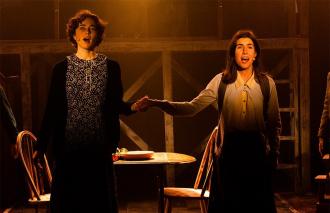“Carrie” is a very well-known story; if you haven’t read the book, you’ve probably seen one of the movie versions. And for those who may not read or watch films — or just want a new take on the story — there is the musical. UC Berkeley’s student-run theatre company BareStage Productions puts on a compelling rendition that, aside from a few falters with tricky material, achieves the heights it reaches for.
“Carrie: The Musical” — based off of Stephen King’s famous horror novel — was written by Michael Gore (music), Dean Pitchford (lyrics) and Lawrence D. Cohen (book). It follows the story of Carrie, a bullied teen, who has been extremely sheltered by her religious fanatic mother, as she discovers she has telekinetic powers. Directed by Claire Pearson, BareStage’s production premiered April 12.
One of the elements that the musical aims to heighten is the insight into character motivations and relationships — achieved through musical numbers from different perspectives. BareStage’s production takes this focus and pushes it even further in effectiveness with a strong cast; each of the supporting roles is on the same level as the leads, coupled with an equally strong direction by Pearson.
All of the actors are so soundly on the same page as an ensemble that it is difficult to name any standouts. Josie Clark carries the weight of the title role, a tricky one to step into, considering Carrie has very little opportunity to speak her mind. Meanwhile, Camilla Leonard as Chris bursts with spite and pride, while Anna Barcellos as Carrie’s mother Margaret is infuriating in her close-minded and submissive nature — both excelling in their paralleled villain roles. The two characters are vital in representing both sides of Carrie’s oppression. Leonard’s Chris is starkly different from Barcellos’s Margaret, yet the effect of that contrast is like they are working together to produce the claustrophobic atmosphere that persists throughout the entirety of the show.
The actors’ collaborative grasps on character relationships are further strengthened by the direction of Pearson. Despite the extremity of many plot points, this is a story set in high school — a detail that Pearson leans into, namely through stage blocking. This decision roots the fantastical story in a very clear reality. For example, Chris’ movements are broader and more frequent than Sue’s, her best friend and foil; Sue has all of the sympathy for Carrie that Chris lacks, making them two very different high schoolers reacting to the presence of an outcast classmate. While Chris bounds around the stage, Sue is often stiffer and stiller — the contrast is subtle but highly reflective of their maturity levels as characters.
All of this is leading up to the climatic scene, which is, unfortunately, where the production falters. The scene depicts Chris getting revenge on Carrie by dropping pig’s blood on her after she is named prom queen (in a fixed vote). Carrie reacts by using the telekinetic powers she has recently discovered to wreak havoc on the school dance, eventually killing almost all of her classmates.
In a prop detail that has a rare pivotal impact on the scene, not nearly enough blood is dropped onto Carrie. It is a shockingly small amount, only covering her head, leaving her white dress practically clean — unsatisfying for anyone who knows the story and expected that bright white dress to be ruined in the famous climax, reflecting the destruction that is yet to come.
Further, the stage blocking becomes a bit convoluted in this complicated scene. Many of the deaths are easily missed because of the sped-up pace. Carrie jumps from using her powers to move a chair to committing mass murder. A more drawn-out scene, in which each death is given its time, would emphasize the extreme consequences of the string of events leading up to the final destruction.
The messy ending does not tarnish the overall strength of the play, however. Rather the success of the production’s carefully laid-out foundation and the actors’ synchronicity only bring more attention to a muddled climax that is already hard to pull off. The climax may be unsatisfying, but BareStage Productions’ “Carrie: The Musical” is not.
Contact Nikki Munoz at nmunoz@dailycal.org.
